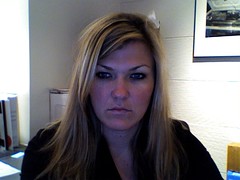Required Reading

Fun with the web cam at work! Did I pull off the smokek eye look, or am I just tired? I have so much to write, but I have actually been working hard recently on getting myself back into academic mood, working on turning my resume into a Cirriculum Vitae and writing an abstract to enter a paper I wrote last year into a conference on Californian history. What am I getting myself back into you may ask? Since one of my closest friends just dropped out of an ivy history program, I certainly am questioning my sanity. But I feel it is right, academic research is what I am "meant to do" if such a thing exists.
So until I have time to write all about my Swedish qualifying exam and my trip to the Swedish Holiday Cultural Festival, I am simply going to share the abstract I am submitting to the history conference with you all. It is an example of the type of research I hope to continue...
PRAGMATISM AND ITS LIMITATIONS: CHICAGO SOCIOLOGISTS, PROTESTANT MISSIONARIES AND THE SURVEY OF RACE RELATIONS
The Scopes trial of the 1920s is often utilized to represent the growing struggle between modernity and fundamentalism, science and God. Few histories focus on the rich gray area between this dichotomy. When missionaries commissioned a sociological survey of the “Oriental Problem” on the west coast in the early 1920s, this proposed project represented the height of the intellectual tenets of pragmatism, progressive cooperation between science and the increasingly modern theology of the social gospel. However, by 1925 the failure of this project to satisfy the needs of either the Chicago sociologists who led the survey or the missionaries, who commissioned it, signified a larger disillusioned turn away from a religious-scientific middle ground. The sociological field aligned itself more closely with science, attempting to strip itself of its reform-oriented roots. The California missionaries, however, remained committed to social engineering and the liberal Christian theology strongly associated with the progressive tradition. In the wake of the Survey on Race Relations, religious intellectuals strengthened the social reach of faith-based organizations to continue the work they previously pursued in tandem with sociology.
Henry Yu’s "Thinking Orientals" is the first monograph to deal extensively with the Survey on Race Relations on the West Coast. Focusing on the division between the white and Asian players in the Survey, Yu separates the “oriental” object of white curiosity from the “collectors of the exotic,” missionaries and sociologists influenced by Enlightenment thought. This categorization, while important, overlooks intellectual historical trends driving the Survey and the significant division simultaneously occurring between the sociological field and missionary work in the 1920s. Greater cooperation and understanding between theology and sociology marked the early twenties, and the Survey of Race Relations should be seen as a pragmatic experiment, an experiment that failed as the alignment between these fields broke down.

0 Comments:
Post a Comment
<< Home